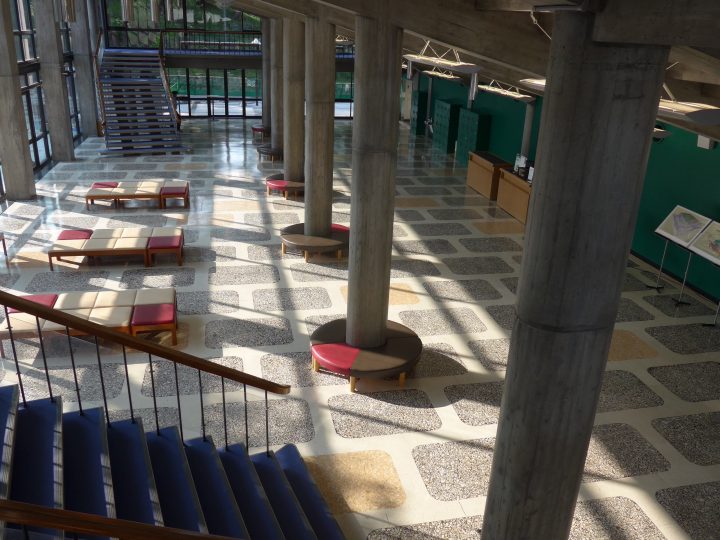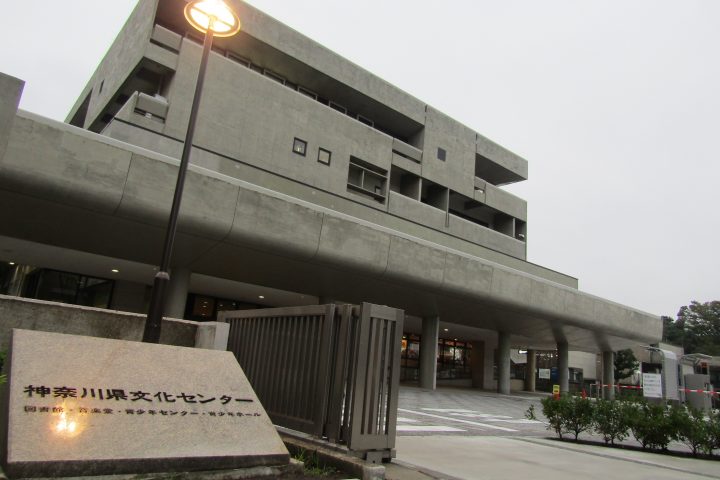From promoting "public baths" to promoting the local community: Masaomi Takahashi of Tsurumi "Shimizu-yu"
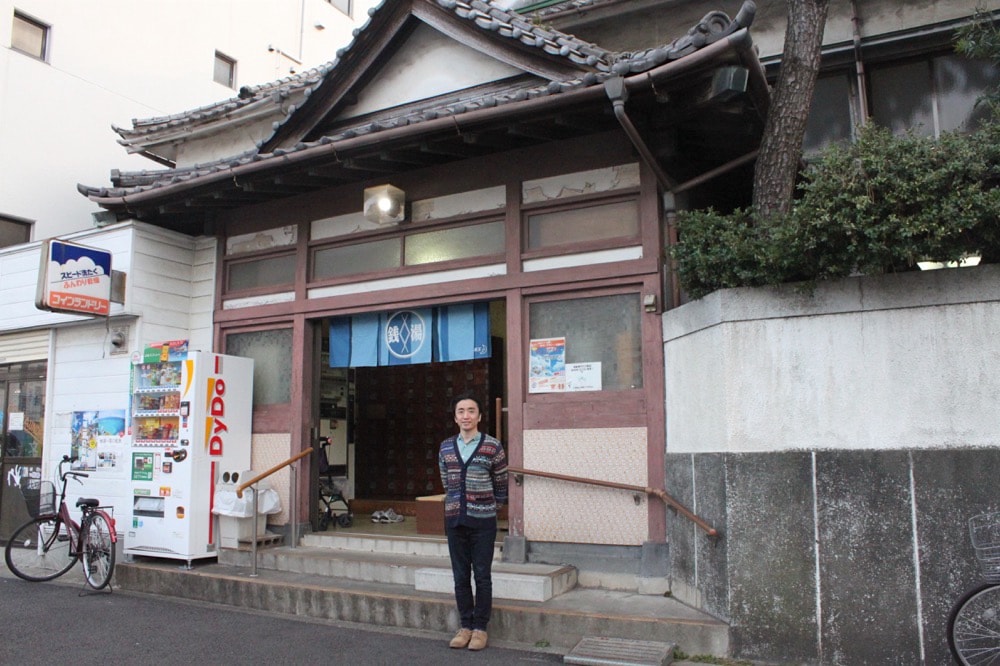
Taking over what is taken for granted
--What made you decide to take over the public bathhouse?
After the third anniversary of my grandmother's death, my father called me and told me that he was thinking about quitting soon. When I was in elementary school, I wrote in my essays that I wanted to take over the bathhouse someday, but I didn't really think about it when I became an adult. I worked for an IT company in Tokyo, and public baths had always been a part of my life, so I thought it would be sad if they disappeared.
I knew that the business wasn't doing so well, but I thought I'd better get involved and then quit, rather than quit without being involved. I wanted to get involved one last time and sort out my feelings.
--Wasn't it scary to quit your job and jump into the public bath industry?
I was worried, but no matter what you do, it's rare to feel completely at ease with something. So I decided to go in the direction I wanted to go.
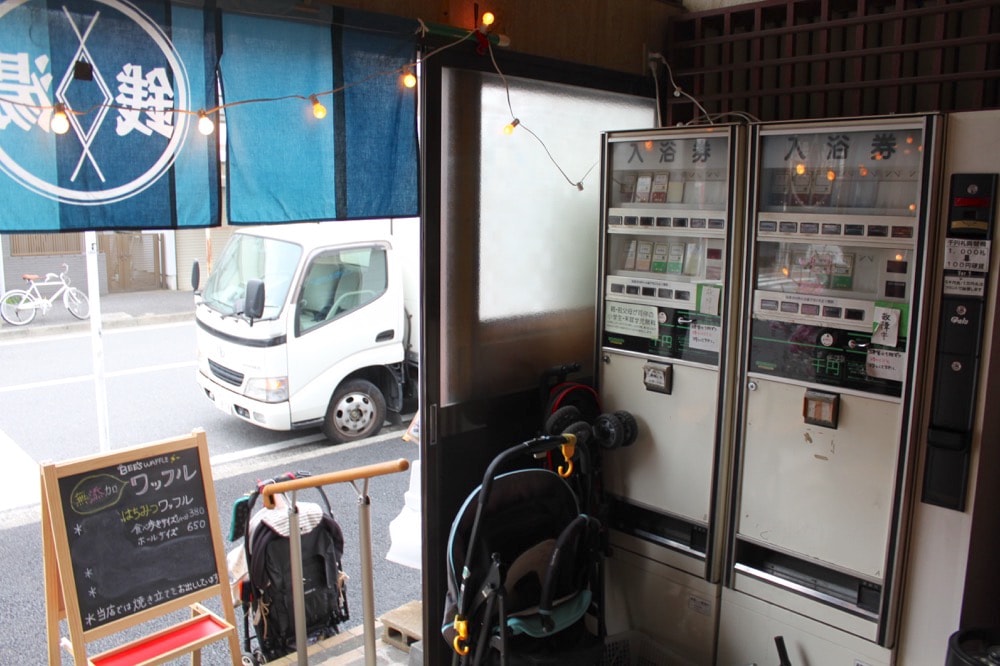
During events, the entrance is lively with decorations, signs, and strollers.
--Did you help out when you were a child?
I didn't have a bath at home until I was in the sixth grade of elementary school, so I always went to public baths. I was even allowed to sit at the reception desk. Since I was a child of the public bath, customers would often talk to me when I was bathing alone, and I became acquainted with most of the people in my neighborhood.
As both my sister and I entered puberty, there was a time when we didn't like that sort of thing, but when we decided to renovate our house and we got to take a bath in our house for the first time, I was so happy (laughs).
"Sento Share House" connects residents with the community
-When you decided to take over the bathhouse, was there anything you had in mind that you wanted to do?
If we only had a public bath, the number of customers would be limited, and we were aware of the difficulties of attracting customers, so we were thinking of increasing our capacity by combining various things. One of those things was the shared house. Rather than selling the fact that we had a public bath, we started it at first as a business that made use of the location. I myself had lived in a shared house in Tokyo and had a lot of fun, so I thought I could make use of that experience.
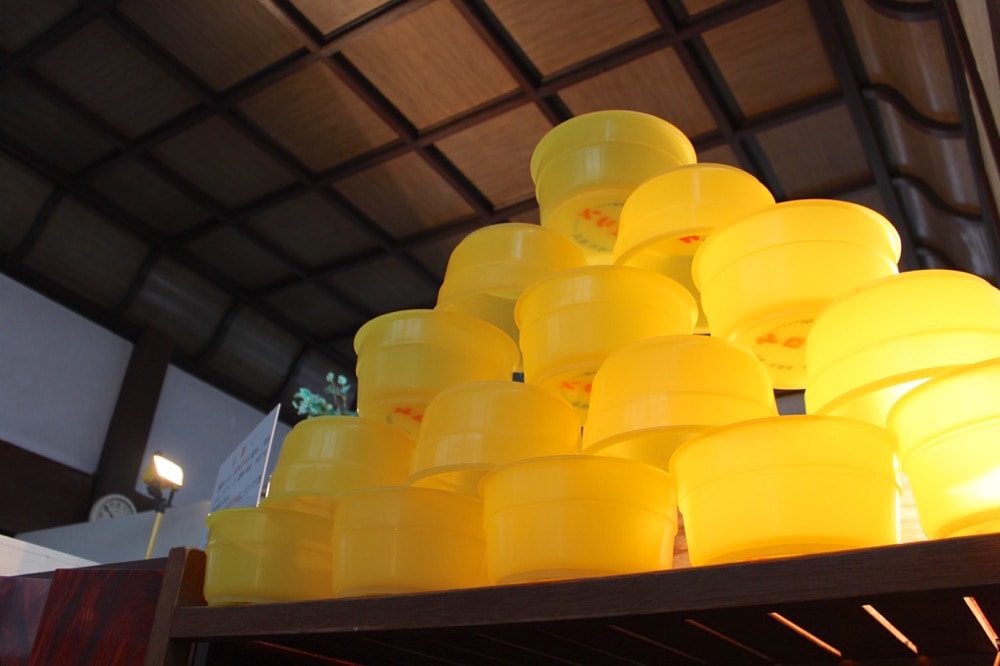
The building itself is very large.
When we first opened, we had people who worked there as live-in residents, so we had rooms for them, and we've expanded the building. We now have eight rooms, including rooms that aren't in use. This year marks our sixth year here, and we have a total of about 20 people living here.
--What kind of people live there?
Some people joined through my wife's connections, or because they happened to have an opening after receiving an inquiry. Most of them are people who run their own companies or are freelancers. There are people who work in web-related fields or in the general distribution of honey, students who are running a venture that connects tourists with students, and people who are planning to start a business in Africa.
It's common for people who have gone abroad for work or study to live there when they return. If there's a vacancy, they can move in right away, and they say things like, "Baths are really nice," so maybe they're unconsciously looking for something Japanese.
--Did you have any criteria in mind for the type of people you wanted to join?
I've been thinking about various things from time to time, but since homes and the surrounding environment are always changing, I hope to make it a place where everyone can share those changes. Two years ago, a couple had a baby, and it became a family environment. It's a bit unusual for a shared house, and some people may be concerned about the baby's crying at night, but we invite people who can accept things that they don't have and things that they may experience in the future as a kind of rehearsal, or a kind of richness, by living with others.
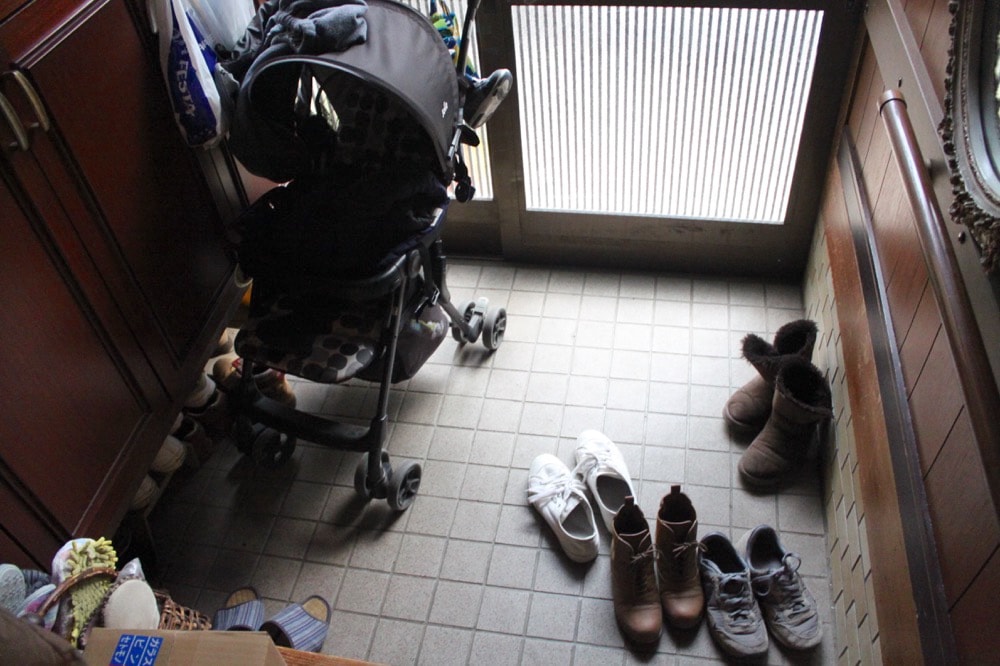
--Does having people like this living there change things at public baths?
By being recognized as a resident of Shimizuyu, it seems that residents and neighbors can talk to each other more easily. Interactions have started without my knowledge, and the oden restaurant nearby is concerned about me, asking, "That girl went to Peru, but where is she now?" and "I heard she's going to Africa?"
I've had local residents act as the receptionist on a few occasions, and the regulars find it amusing, and sometimes we get exchanges like, "Who are you?" and "I live here" (laughs).
In addition, since the public bath and the share house are businesses that are limited to the location, we tried to create opportunities to talk to local people walking around the town, and cooperated with the residents to set up stalls selling shaved ice and roasted sweet potatoes. We also participated in local festivals, and everyone helped carry the mikoshi (portable shrine).
A place where many different people can come together
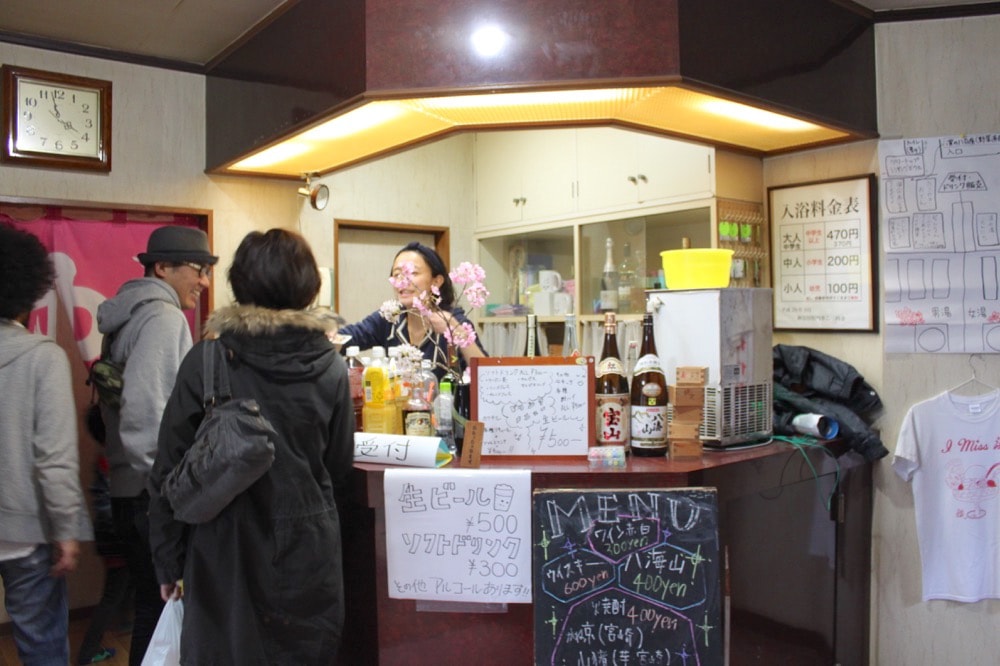
The ticket booth will also serve as a drink counter on the day of the cherry blossom viewing festival.
--There are a lot of unusual events held at public baths.
Up until now, we have held yoga, pilates, dance workshops, etc. in the changing rooms. Through connections, we have been asked to be instructors, and we have also been approached by people who want to hold classes at Shimizuyu.
Then, I thought I could use the reception desk to create an opportunity to generate some kind of communication, and so I came up with the idea for a public bath bar. With the help of a friend who works as a traveling bartender, I was able to have regulars at the public bath, people who lived nearby but had never been to a public bath before, and even my acquaintances who live in Tokyo come all the way. It was a little difficult to get 10 people to come because the place was small. It's a lot of work to call a bartender every time, so I'd like to continue doing this in a simpler format in the future.
Shin.
--The share house and these events really show the breadth of Takahashi's social circle.
Rather than being well-known, I go out and talk to a lot of different people, and that's how I get inspiration and ideas. There's a limit to what I can come up with if I think about it all by myself, so I try to be quick on my feet and go outside to look for information, with the help of people who have been working at the bathhouse for a long time.
Holding events is great because it allows us to create an environment with different people coming and going than usual.
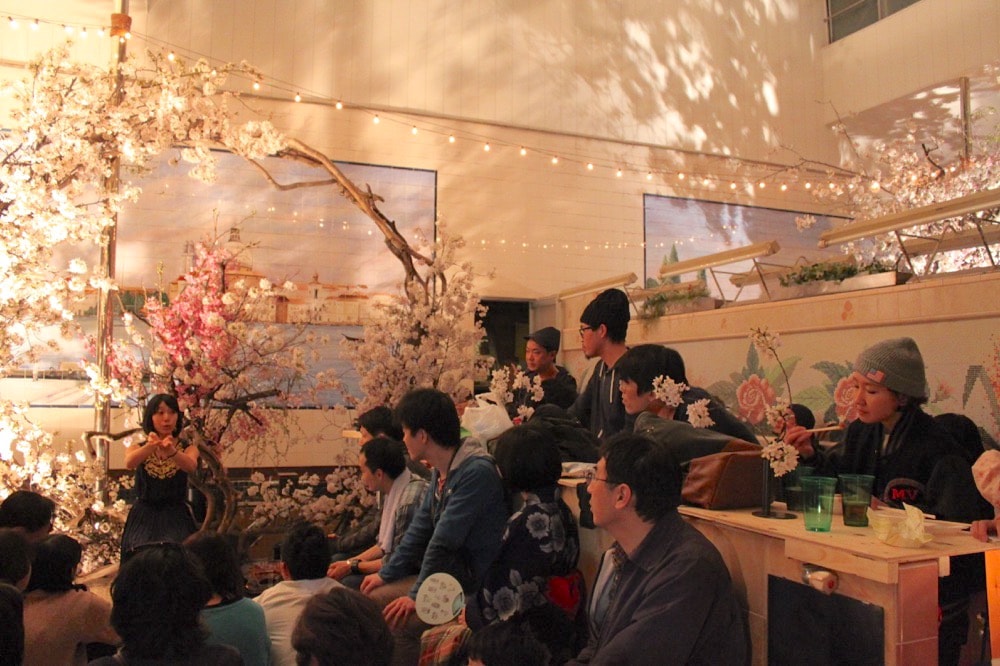
The cherry blossom viewing festival will be divided into a daytime and evening session, with live music and readings.
--How did the annual cherry blossom viewing festival begin?
Soon after I took over, a typhoon blew the roof off and we had to close the bathhouse for repairs. We couldn't use the baths and there was nothing there, but we thought it would be encouraging just to have people gather, so the first time, we decorated with some cherry blossoms and had a meal together inside.
Since then, with the help of many people, the event has grown in scale, and last year we had musicians performing live, a vendor selling snacks like oden and takoyaki, a greengrocer selling local vegetables, a Thai massage parlor, an accessory shop, and a second-hand bookstore.
The majority of my customers were young people from Tokyo, including not only people I knew, but also people who knew people I knew, and the taxi company staff seemed a bit puzzled. "All the girls going from the station to Shimizuyu are cute, what's up with that?" (laughs).
What we can do for our regular customers and local people
--It's become an event that has a great influence through social media and word of mouth.
Last year, a total of about 130 people came. However, I feel that it is very difficult to spread the word to local people. We handed out free tickets to local people, and members of the senior citizens' association and neighborhood association came, but the space was small and it may have been difficult for some people to get in. It was interesting to see the regulars and young people from Tokyo drinking together, though.
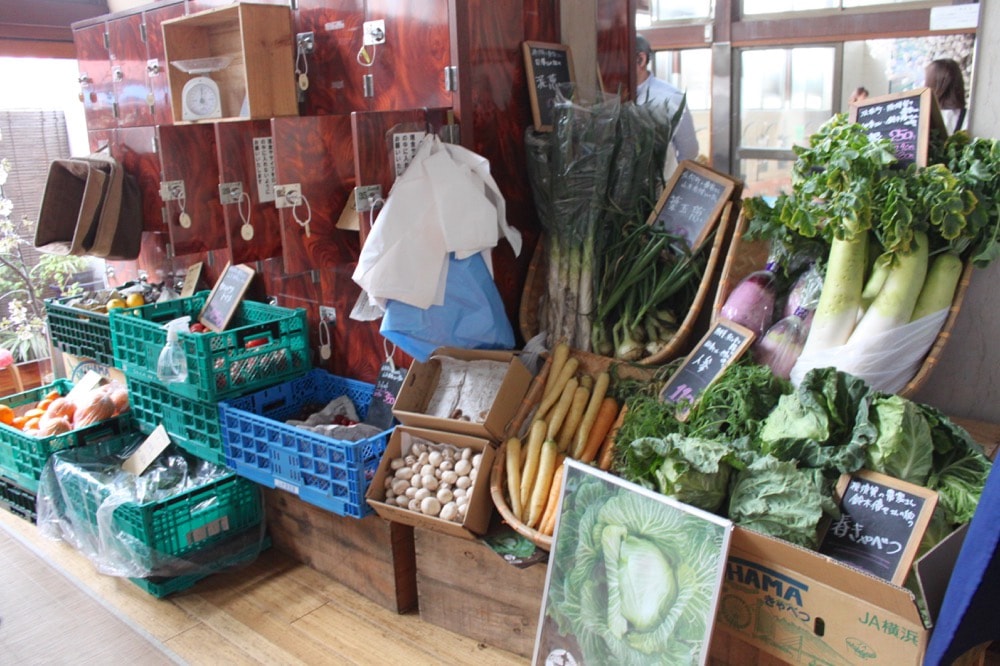
A greengrocer from Yokohama also set up a stall.
It will be difficult to hold a cherry blossom viewing event this year due to personnel limitations, but in the future we would like to think of more ways to benefit our regular customers and those who live nearby, such as a bar-like place to communicate or a small market held together with local shops.
There seem to be a lot of men living alone in this area, so I thought it would be more comfortable if there were a lot of manga, so I've been collecting manga little by little recently. I can't compete with the amount of manga at super public baths, so I thought it would be interesting to focus on rare manga and manga that I want to introduce. I'd like to make a bookshelf and expand the floor.
--Does this mean that you will be shifting direction from big events onwards?
The cherry blossom viewing event and the sale of merchandise such as sento T-shirts were all done with the hope of drawing attention to sento themselves, and now that sento are becoming quite a hot topic, I feel that doing it within Tokyo will have a greater impact than doing it myself.
This is often seen as the whole bathhouse industry, but in reality it's not that different from restaurants, and there are places that are doing well and places that aren't, and I think there are various ways of doing things depending on whether it's in front of a station or far away, etc. There are many people who promote the industry as a whole, so I'd like to focus more on what I can do at my own bathhouse.
Initially, I was hoping to do it for around three years, so in a way it's unexpected that we've continued this far, but I'd like to be able to continue for even one more day as we work through various practical issues for the sake of our regular customers.
